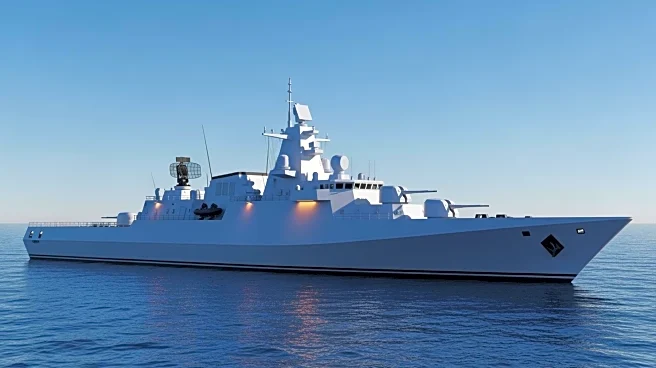What's Happening?
ST Engineering has launched the Republic of Singapore Navy's first Victory-class Multi-Role Combat Vessel (MRCV), named Victory, at its Benoi Yard. This vessel is the first of six MRCVs to be constructed
under a contract awarded by the Ministry of Defence in 2023. The MRCV is designed to serve as a 'mothership' for unmanned systems, supporting operations across air, surface, and subsurface domains. It is equipped for a range of missions, including maritime security, surveillance, and high-intensity combat. The vessel's design was refined using 3D modeling and digital twinning, reducing the need for physical prototypes and minimizing material waste.
Why It's Important?
The launch of the MRCV marks a significant advancement in naval capabilities for Singapore, enhancing its ability to conduct diverse maritime operations. The integration of unmanned systems reflects a shift towards more autonomous and technologically advanced naval strategies. This development could strengthen Singapore's maritime security and influence in the region, potentially impacting regional naval dynamics. The use of digital technologies in shipbuilding demonstrates a trend towards more efficient and sustainable construction practices, which could be adopted by other nations.
What's Next?
The MRCV Victory will undergo further outfitting, integration, and sea trials at Gul Yard. ST Engineering plans to deliver the fleet of MRCVs to the Republic of Singapore Navy progressively from 2028 onwards. As these vessels replace the existing Victory-class Missile Corvettes, they are expected to enhance Singapore's naval capabilities and operational flexibility. The successful deployment of these vessels could lead to further investments in unmanned and autonomous naval technologies.
Beyond the Headlines
The shift towards unmanned systems in naval operations raises questions about the future role of human personnel in maritime security. The ethical considerations of autonomous systems in combat scenarios are significant, potentially influencing international regulations and standards. Additionally, the environmental benefits of reduced material waste in shipbuilding could contribute to more sustainable practices in the industry.









